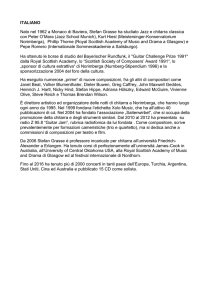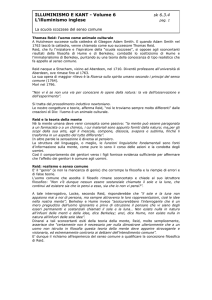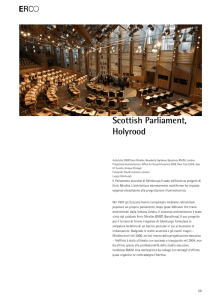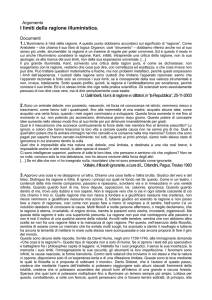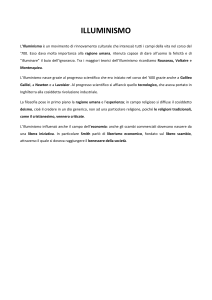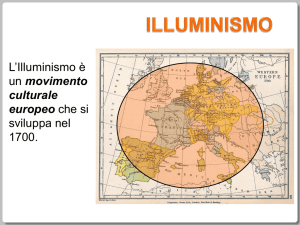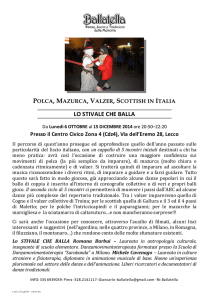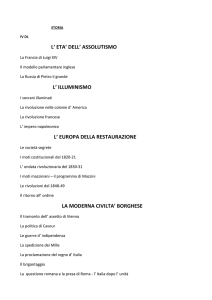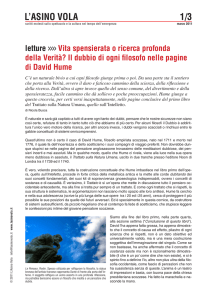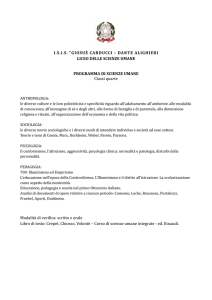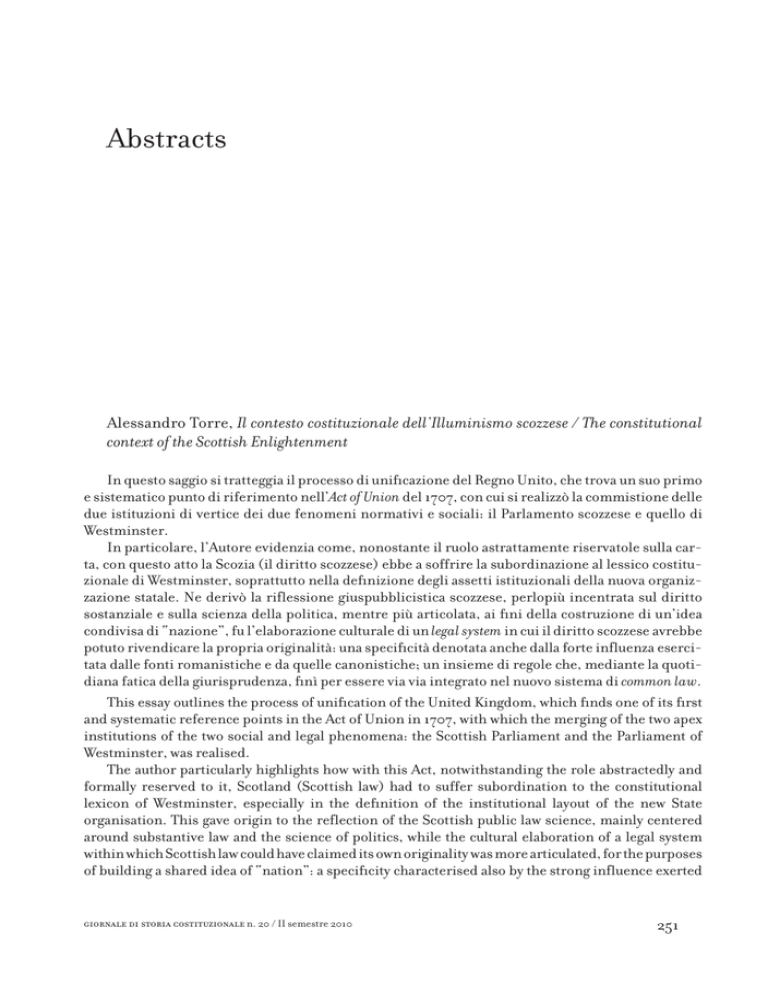
Abstracts
Alessandro Torre, Il contesto costituzionale dell’Illuminismo scozzese / The constitutional
context of the Scottish Enlightenment
In questo saggio si tratteggia il processo di unificazione del Regno Unito, che trova un suo primo
e sistematico punto di riferimento nell’Act of Union del 1707, con cui si realizzò la commistione delle
due istituzioni di vertice dei due fenomeni normativi e sociali: il Parlamento scozzese e quello di
Westminster.
In particolare, l’Autore evidenzia come, nonostante il ruolo astrattamente riservatole sulla carta, con questo atto la Scozia (il diritto scozzese) ebbe a soffrire la subordinazione al lessico costituzionale di Westminster, soprattutto nella definizione degli assetti istituzionali della nuova organizzazione statale. Ne derivò la riflessione giuspubblicistica scozzese, perlopiù incentrata sul diritto
sostanziale e sulla scienza della politica, mentre più articolata, ai fini della costruzione di un’idea
condivisa di “nazione”, fu l’elaborazione culturale di un legal system in cui il diritto scozzese avrebbe
potuto rivendicare la propria originalità: una specificità denotata anche dalla forte influenza esercitata dalle fonti romanistiche e da quelle canonistiche; un insieme di regole che, mediante la quotidiana fatica della giurisprudenza, finì per essere via via integrato nel nuovo sistema di common law.
This essay outlines the process of unification of the United Kingdom, which finds one of its first
and systematic reference points in the Act of Union in 1707, with which the merging of the two apex
institutions of the two social and legal phenomena: the Scottish Parliament and the Parliament of
Westminster, was realised.
The author particularly highlights how with this Act, notwithstanding the role abstractedly and
formally reserved to it, Scotland (Scottish law) had to suffer subordination to the constitutional
lexicon of Westminster, especially in the definition of the institutional layout of the new State
organisation. This gave origin to the reflection of the Scottish public law science, mainly centered
around substantive law and the science of politics, while the cultural elaboration of a legal system
within which Scottish law could have claimed its own originality was more articulated, for the purposes
of building a shared idea of “nation”: a specificity characterised also by the strong influence exerted
giornale di storia costituzionale n. 20 / II semestre 2010
251
Abstracts
by Roman-law and Canon-law sources; a set of rules which, by way of daily toil of jurisprudence,
ended up being gradually integrated into the new system of Common law.
Christopher J. Berry, Creating Space for Civil Society: Conceptual Cartography in the
Scottish Enlightenment / Creare spazio per la società civile: la cartografia concettuale
dell’Illuminismo scozzese
Nella storia del pensiero occidentale, molte teorie hanno agito potentemente nell’affermazione
di inclinazioni, sentimenti e concetti su cui si è poi concretamente costruita e retta la costituzione
sociale: e questo al di là della loro valenza logico-sperimentale. Lo dimostra l’idea di “società civile”
che, durante tutto il secolo XVIII, svolse un ruolo importante nello sviluppo dell’importante fenomeno giuspolitico che va sotto il nome di “illuminismo scozzese”.
Con questo saggio, l’Autore focalizza l’attenzione sui personaggi di spicco di questo movimento
(Smith, Hume, Kames, Robertson e Ferguson, fra gli altri), all’interno del quale venne via via a crearsi un “spazio concettuale” (conceptual space) con cui si sviluppò una nuova idea di società civile:
un’idea dotata di sue peculiari caratteristiche rispetto alle nozioni di “Stato” e di “Costituzione”,
con le quali veniva spesso associata negli altri contesti dottrinari. Nell’ambiente illuminista scozzese la società civile veniva invece ad essere identificata con quell’insieme di regole e di istituzioni
che, assieme alle regole familiari, religiose ed economiche, includevano anche le abitudini, le credenze e i costumi capaci di tenere assieme il tessuto sociale di una nazione.
In the history of Western thought, many theories powerfully acted on the affirmation of
tendencies, feelings and concepts upon which the social constitution is then built and stands: and
this beyond their logical-experimental value. This is demonstrated by the idea of “civil society”
which, during all of the Eighteenth century, carried on an important role in developing the
significant juridical-political phenomenon known as “Scottish Enlightenment”.
In this essay, the Author focuses on prominent characters of this current (Smith, Hume, Kames,
Robertson and Ferguson, among others), within which a “conceptual space” was gradually created
by way of which a new idea of civil society developed: an idea endowed with peculiar characteristics
of its own with regard to the notions of “State” and “Constitution” to which it was often associated
in other doctrinal contexts. In the environment of the Scottish Enlightenment, the civil society was
instead identified with that whole of rule and institutions which, together with family, religious and
economic rules, also included habits, beliefs and customs which are able to hold the social fabric of
a nation together.
Francesco Alicino, La “struttura ecclesiastica” dello Scottish Enlightenment. Le origini
dell’Illuminismo scozzese fra religione naturale e teologia razionale / The “Ecclesiastical
Structure” of Scottish Enlightenment between natural religion and rational theology
Fra la fine del XVII secolo e la seconda metà del XVIII secolo la Scozia affrontò mutamenti costituzionali molto rilevanti, concernenti la relazione fra Stato e Chiese. In questo contesto, la “que-
252
Abstracts
stione religiosa” continuò a giocare un ruolo cruciale, ponendosi – come spesso nel passato – in
cima all’agenda politica. Comunque tale agenda era influenzata anche dal movimento intellettuale
chiamato Illuminismo scozzese, che diede un contributo importante all’evoluzione della Chiesa
Scozzese che era Calvinista nei documenti ufficiali, ma Presbiteriana nel suo ordine ecclesiastico.
Dopo considerazioni generali sul processo di secolarizzazione (diffuso in Europa al tempo) l’autore analizza la peculiare evoluzione delle relazioni tra la Chiesa Scozzese e l’illuminismo scozzese,
che influenzarono anche il sistema costituzionale di questo paese.
Between the late 17th century and the second half of the 18th century Scotland faced most
important constitutional changes, involving the relationships between the State and the Churches.
In this context, the “religious question” continued to play a crucial role, finding its place – as so often
in the past – at the heart of the political agenda. However, this agenda was also influenced by the
intellectual movement called Scottish Enlightenment, which provided an important contribution
to the evolution of the Scottish Established Church that was Calvinist in its official documents, but
Presbyterian as regards its ecclesiastical order.
Following general considerations about the process of secularization (which was widespread
in Europe at that time), the author analyses the peculiar evolution of relationships between the
Scottish Established Church and the Scottish Enlightenment, which also affected the constitutional
system in that country.
Oili Pulkkinen, Statesmanship and Scottish Jurisprudence / Arte di governo e giurisprudenza scozzese
Nella storia della teoria e della pratica giuspolitica occidentale l’illuminismo scozzese si è distinto anche per l’abilità dei alcuni giuristi nel saper unire la tradizione della giurisprudenza romana con la concezione della “legge universale di natura”. Ne conseguono molte teorie che hanno
cercato di spiegare le origini (e le ragioni) della società politica, il ruolo della legge e quello del
sovrano. In particolare, la sovranità viene qui concepita come un potere capace di riassorbire tutti
gli altri, la forza coesiva che tiene assieme tutta la società. Il diritto diventa così il vettore che traduce
la volontà del sovrano en ordre d’État, razionalmente valutato.
In questo saggio, l’Autore focalizza l’attenzione sul ruolo dello “statista” che spesso agisce dietro
le quinte di un potere sovrano, giustificando la sua azione di lawmaker – un’azione condizionata da
pensieri ed interessi individuali – sulla base di una legge “pretesamente” universale. Da cui la capacità di “trovare” (scoprire) leggi particolari che riflettano la saggezza universale in un dato contesto
giuspolitico e sociale.
In the history of Western juridical-political theory and practice, the Scottish Enlightenment
distinguished itself also for the ability of certain jurists in knowing how to unite the tradition of
Roman jurisprudence with the conception of the “universal natural law”. Many theories which tried
to explain the origins (and the reasons) of political society, the role of the statute law and that of
the sovereign originated from it. Particularly, sovereignty is here thought of as a power which is
able to reabsorb all others, the cohesive strength which holds together all society. The law therefore
becomes the vector which translates the sovereign will into rationally evalued ordre d’État.
In this essay, the author focuses on the role of the “statesman” who often acts behind the scenes
for a sovereign power, justifying his acting as lawmaker – an acting conditioned by individual thought
and interests – on the basis of a “pretend” universal law. From which the capacity of “finding”
253
Abstracts
(discovering) particular laws which reflect the universal wisdom in a given juridical-political and
social context originates.
Marco Geuna, Il contratto sociale nell’Illuminismo scozzese: percorsi della ricezione e della
critica di un’idea moderna / The social contract in Scottish Enlightenment: paths of the
reception and the criticism of a modern idea
In questo saggio si analizza l’influsso del diritto naturale moderno, e in particolare le elaborazioni teoriche che fanno capo a Grozio e a Pufendorf, su alcuni pensatori dello Scottish Enlightenment. L’attenzione si sofferma su Gershom Carmichel, Francis Hutcheson e Thomas Reid – titolari
in momenti successivi della cattedra di filosofia morale dell’Università di Glasgow – al fine di evidenziare la peculiarità della ricezione della teoria contrattualistica da parte delle variegate correnti
della riflessione filosofica politica e morale del Settecento scozzese.
La vicenda dell’interpretazione scozzese della dottrina dei “duo pacta et unum decretum” è significativa per le sue stesse deformazioni e semplificazioni in quanto attesta la grande circolazione
dei testi e delle idee, nei primi decenni del Settecento, nei paesi protestanti. Gli intellettuali scozzesi, tutt’altro che chiusi in una dimensione provinciale, riformulano patrimoni concettuali provenienti da differenti tradizioni culturali, rielaborandole nei più diversi ambiti della ricerca sulla
natura umana. Le teorie offriranno un distinto inquadramento al tema dei diritti naturali e a quello
– consequenziale – della loro limitazione nella vita associata.
This essay analyses the influence of modern natural law, and particularly the theoretical
elaborations made by Grotius and Pufendorf, upon certain thinkers of the Scottish Enlightenment.
It focuses on Gershom Carmichel, Francis Hutcheson and Thomas Reid – who held, at different
times, the chair of moral philosophy at the University of Glasgow – in order to highlight the
peculiarity of the reception of the contractual theory by the manifold trends of the philosophical,
political and moral reflection of the Scottish Eighteenth century.
The episode of the Scottish interpretation of the doctrine of the “duo pacta et unum decretum”
is significant for its deformations and simplifications, in that it testifies to the great circulation of
texts and ideas in protestant countries during the first decades of the Eighteenth century. Scottish
intellectuals, who are anything but closed within a provincial dimension, reformulate conceptual
heritage coming from different cultural traditions, re-elaborating it in the most unlikely bedfellow
fields of research on human nature. Theories will offer a distinct framing of the theme of natural
rights and consequentially of that of their limitation of an associated life.
Craig Smith, The Scottish Enlightenment’s reflection on Mixed Government / La riflessione
dell’Illuminismo scozzese sul governo misto
Le virtù della teoria e della pratica del “governo misto” sono state ampiamente analizzate dal
pensiero politico moderno e contemporaneo. Da questo punto di vista è tuttavia opportuno sottolineare il contributo, troppo poco analizzato, dato in tal senso da quel sorprendente raggruppamento
di pensatori sociali e politici che diedero vita all’illuminismo scozzese. A primo acchito, infatti, dal
254
Abstracts
contesto illuminista scozzese emerge uno scarso interesse per l’idea del Mixed Government e della
Mixed constitution, che trovò grande risalto in Gran Bretagna. Questo saggio si propone invece di
dimostrare la perfetta consonanza fra questa teoria e l’approccio delle scienze sociali, così come
sviluppate in Scozia in questo particolare periodo.
In tal caso, vengono in rilievo figure del calibro di David Hume, Adam Smith, Adam Ferguson e
John Millar, da molti riconosciuti come i padri fondatori delle scienze sociali moderne. Particolare
attenzione è dedicata a Hume che, con la sua “scienza dell’uomo” cerca di fornire una spiegazione scientificamente distaccata dello sviluppo e del funzionamento delle istituzioni politiche. Il che
porta Hume a percepire lo sviluppo della forma britannica del Mixed Government come un aspetto
specifico del più ampio ed articolato fenomeno sociale.
The virtues of theory and practice of the “mixed government” have been widely analysed by
modern and contemporary political thought. However from this point of view, it is opportune to
underline the contribution, too-little analysed, given in such direction by that surprising group of
social and political thinkers who gave birth to the Scottish Enlightenment. At first sight, indeed,
a scarce interest for the idea of the Mixed Government and of the Mixed Constitution, which was
given a great emphasis in Great Britain, surfaces from Scottish Enlightenment context. This essay
has the aim instead of demonstrating the perfect tuning between this theory and the approach of the
social sciences, as they are developed in Scotland in this particular period.
In such a case, figures of the calibre of David Hume, Adam Smith, Adam Ferguson and John
Millar by many recognised as the founding fathers of modern social sciences stand out. Special
attention is paid to Hume who, with his “science of man” tries to provide a scientifically detached
explanation of the development and functioning of political institutions. This leads Hume to
perceive the development of the British form of the Mixed Government as a specific aspect of the
wider and more articulated social phenomenon.
Maria Pia Paganelli, The Scottish Enlightenment and public governance of the economic
system / L’Illuminismo scozzese e il governo pubblico del sistema economico
È noto oramai: una parte importante della filosofia illuminista scozzese, a cominciare da Adam
Smith, ha alimentato l’idea che una società rettamente governata debba conformarsi sul sistema di
regole posto in essere dalle libertà naturali. Sul terreno più strettamente economico e sociale, ciò si
traduce nella concezione della free economic system le cui norme spingono, naturalmente, gli individui verso l’opulenza e la libertà: l’interesse di ciascuno a perseguire la propria felicità si tramuta nel
benessere generale e, di conseguenza, nella stabilità dell’intera società. In questo saggio, l’Autrice
analizza la nozione di natural system of liberty, evidenziando ambiguità ed incoerenze che la fanno
apparire come un prodotto “artificiale”. Oltre alla “forza” dell’interesse individuale, nella società
agiscono tutta una serie di altre tendenze, tra loro spesso confliggenti e che, per questo, si frappongono all’obiettivo dell’equilibrio sociale ed economico. Si scopre così che, alla luce dell’esperienza
e di quanto messo in evidenza da altri studiosi nel corso di questi ultimi decenni, sotto la natural
system of liberty cova un vero e proprio wishful thinking, generato dai più eminenti illuministi scozzesi per sostenere il loro ideale di società. Più in generale, questo dimostra che le norme (comprese
quelle che disciplinano il libero mercato) sono il frutto di un attrito sociale: esse non s’impongono
ex nihilo, ma sono opera dell’uomo, che le afferma secondo i pensieri, la tradizione e la cultura giuridica di una data società in un dato contesto storico.
255
Abstracts
It is by now well-known that an important part of Scottish enlightenment philosophy, starting
from Adam Smith, fed the idea that an honestly ruled society must conform to the system of rules
elaborated by natural freedoms. On more strictly economic and social grounds, this translates into
the conception of free economic system whose rules naturally push individuals towards wealth and
freedom: the interest of everybody to pursue his own happiness changes into general wellbeing and
consequently into the stability of the whole society. In this essay, the author analyses the notion
of natural system of liberty, highlighting ambiguousness and incoherencies which make it appear
as an “artificial” product. Besides the “power” of individual interest, in society a whole series of
other tendencies acts, and which are conflicting among themselves and which, for this reason,
place themselves between the achievement of social and economic balance. In such a way we can
find that, in light of the experience and of that which has been highlighted by other scholars in
the last decades, true wishful thinking, generated by the most eminent Scottish Enlightenment
followers in order to support their ideal of society, is hidden behind the natural system of liberty.
More generally, this demonstrates that the rules (including those which regulate free trade) are the
fruit of a social friction: they do not assert themselves ex nihilo, on the contrary they are produced
by man, who affirms them according to thoughts, tradition and juridical culture of a given society
within a given historical context.
Claudio Martinelli, Libertà e Ragione: connessioni e parallelismi tra illuministi lombardi
e scozzesi sulla strada della modernità / Freedom and reason: connections and parallelisms
between Lombard and Scottish Enlightenment followers of the path toward modernity
Nel saggio si analizzano le influenze culturali che hanno inciso sugli illuministi lombardi, gruppo eterogeneo i cui principali esponenti furono Pietro Verri e Cesare Beccaria. Il loro principale
referente teorico, la referenza fondatrice, è la Francia della seconda metà del ’700, faro all’epoca
dell’intera cultura europea. Tuttavia molti degli intellettuali italiani del XVIII secolo collocano nel
loro Pantheon autori britannici, e soprattutto scozzesi: Bacon, Newton, Locke, Hutcheson, Hume,
Smith, il cui atteggiamento moderato e pragmatico risulta ai lombardi più congeniale rispetto agli
entusiasmi razionalistico-astratteggianti dei francesi. Anche l’utilitarismo di Bentham e poi quello
di Mill offre lo spunto per un’etica laica ed anticonformista, in cui la felicità, e quindi il superamento del dolore, è visto come molla di ogni civilizzazione. Il loro contributo più interessante va
rintracciato nel campo della scienza giuridica in cui si persegue l’obiettivo della certezza del diritto,
svincolato dalla morale religiosa e connesso con quel contratto immanente che dà vita alla Stato.
Il filo rosso che accomuna i vari pensatori è quello della libertà economica come irrinunciabile
diritto individuale sul quale edificare una società libera, aperta ed antiautoritaria.
This article analyses the cultural influences which had a lasting effect on Lombard Enlightenment
followers, a heterogeneous group whose main figures were Pietro Verri and Cesare Beccaria. Their
main theoretical point of reference, the founding reference, is France of the second half of the
Eighteenth century, at the time guiding light of all European culture. Nevertheless, many Eighteenthcentury Italian intellectuals place British, and especially Scottish, authors in their Pantheon, like:
Bacon, Newton, Locke, Hutcheson, Hume, Smith. Indeed, their moderate and pragmatic attitude
was more congenial to the Lombard thinkers than the rationalistic abstractionist enthusiasms of
the French philosophers. Benthamic utilitarianism as well and then that of Mill offers the starting
idea for a lay and anti-conformist ethics, in which happiness, and therefore the overcoming of
256
Abstracts
sufferance, is seen as a spring for every civilisation. Their most interesting contribution has to be
found in the field of juridical science which pursues the aim of certainty of law, free from religious
morality and linked with that immanent contract that gives birth to the State.
The thread which binds the various thinkers together is that of economic freedom as irrenunciable
individual right upon which a free, open and anti-authoritarian society can be built.
Francesco Mastroberti, La diffusione del pensiero di Thomas Reid in Italia meridionale
agli inizi dell’Ottocento / The spreading of the thought of Thomas Reid in Southern Italy at
the beginnings of the Nineteenth century
Nell’Europa della prima metà del XIX secolo, la Restaurazione favorisce l’affermazione di un
pensiero “scettico” e notevolmente critico nei confronti delle idee che, fino a pochi anni prima,
hanno animato l’illuminismo filosofico, politico e giuridico: il razionalismo, il giusnaturalismo
hanno – secondo il comune sentire – condotto a disastri, senza peraltro giungere a risultati tangibili
sul piano sociale, economico e culturale. In questo clima di complessivo ripensamento della tradizione illuministica continentale, viene così a crearsi anche lo spazio per la riscoperta di autori fino
ad allora poco valorizzati. Lo dimostra l’opera di Thomas Reid, esponente di spicco del pensiero
giuspolitico scozzese di fine Settecento, che, come emerge chiaramente da questo saggio, in Italia,
e segnatamente nell’Italia meridionale, viene ad essere valorizzato proprio dall’importante “scuola
napoletana”. In particolare, l’Autore evidenzia come il pensiero di Reid si sia diffuso in Italia soprattutto sotto il Regno delle Due Sicilie, mediante l’impegno profuso da importanti esponenti del
foro napoletano, quali Gaspare Capone e Davide Winspeare.
In Europe of the first half of the Nineteenth century, the Restoration favours the affirmation of
a sceptical and noteworthily critical thought with respect to the ideas that, until few years before,
animated philosophical, political and juridical Enlightenment: rationalism and doctrines of
natural law have – according to the common feeling – led to disasters, without however reaching
tangible results on social, economic and cultural levels. In this climate of overall rethinking of the
continental Enlightenment tradition, the space for rediscovering authors, until then little valued, is
then created as well. This is demonstrated by the work of Thomas Reid, one of the main characters
of Scottish juridical-political thought of the end of the Eighteenth century, who, as we can clearly
see in this essay, in Italy, and especially in Southern Italy, is given the greatest importance by the
“scuola napoletana” (Neapolitan school). Particularly, the author highlights that Reid’s thoughts
spread throughout Italy especially in the Kingdom of the Two Sicilies, by way of the commitment
profused by important figures of the Neapolitan Bar, like Gaspare Capone and Davide Winspeare.
Iain McLean, Scot M. Peterson, The influence of the Scottish Enlightenment on American
Constitutionalism / L’influenza dell’Illuminismo scozzese sul costituzionalismo americano
Numerose, e di sicuro rilievo scientifico, sono le analisi prodotte nel corso degli anni circa l’influenza esercitata dalla plurisecolare British Constitution sulla democrazia costituzionale americana.
Pochi però hanno evidenziato i legami esistenti tra il costituzionalismo scozzese, distinto (e per
257
Abstracts
alcuni aspetti distante) da quello inglese, e il processo di costituzionalizzazione americano. Eppure,
se si focalizza l’attenzione su alcuni concetti e soprattutto sui personaggi che hanno concretamente partecipato all’affermazione della Costituzione americana, si evidenziano insospettabili, quanto fondamentali, legami tra questi due ambiti: legami che hanno ad esempio segnato il pensiero e
nell’opera di alcuni tra i più importanti Founding Fathers americani. Ed è quanto gli Autori di questa
ricerca cercano di sottolineare.
In particolare, con questo saggio si pone l’accento sull’influenza esercitata da due esponenti
di spicco dell’illuminismo scozzese, David Hume e Adam Smith, su due Padri nobili del costituzionalismo americano, James Madison e Thomas Jefferson. Il che favorirà l’individuazione delle
coordinate filosofico-politiche per comprendere, fra l’altro, i principi costituzionali su cui si è poi
inverato il sistema di relazione Stato-Chiese nella storia del repubblicanesimo americano.
There are numerous and truly scientifically significant analyses produced during the years on the
influence exerted by the centuries-old British Constitution on American constitutional democracy.
However few highlighted the existing links between Scottish constitutionalism, distinct (and for
certain aspects far away) from the English one, and the process of American constitutionalization.
Though, if we focus our attention on certain concepts and especially on the people who actively took
part in the affirmation of the American constitution, unexpected and fundamental links between
these two spheres can be highlighted: links which, for example, marked the thought and the work of
some among the most important American Founding Fathers. This is what the authors of this piece
of research work try to underline.
Particularly, this essay stresses the influence exerted by two Scottish Enlightenment followers,
David Hume and Adam Smith on two noble Fathers of American constitutionalism: James Madison
and Thomas Jefferson. All this will favour the individualisation of the philosophical political
coordinates in order to understand, among other things, the constitutional principles upon
which the system of relationship between State and Churches is built in the history of American
republicanism.
258


